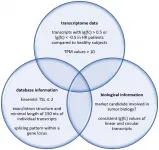Interactive police line-ups improve eyewitness accuracy - study
2021-07-09
(Press-News.org) Eyewitnesses can identify perpetrators more accurately when they are able to manipulate 3D images of suspects, according to a new study.
A team of researchers in the University of Birmingham's School of Psychology developed and tested new interactive lineup software which enables witnesses to rotate and view lineup faces from different angles.
When the eyewitnesses were able to rotate the image to match the alignment of the face in their memory, they were more likely to accurately pick out the criminal from the lineup.
Lineups are used around the globe to help police identify criminals. Typically these involve witnesses examining an image of the suspect alongside 'fillers' - individuals who look similar, but who weren't involved in the crime.
The ability of the eyewitness to accurately identify guilty from innocent suspects is known as discrimination accuracy. According to the US-based Innocence Project, misidentification is the single greatest cause of wrongful conviction in the US. Since 1989, 365 wrongful convictions have been overturned on the basis of new DNA evidence; reliance on inaccurate eyewitness testimony played a role in securing convictions in many of these cases. Improving discrimination accuracy is therefore clearly important for more reliably identifying criminals.
Professor Heather Flowe, co-lead researcher, said: "We worked closely with law enforcement to develop the interactive lineup procedure to be cost effective and work with current police identification systems. The procedure is a significant advance in improving the accuracy of eyewitness identifications."
In the experimental study, published in Nature's Scientific Reports, researchers recruited more than 3,000 volunteer 'witnesses' to test their discrimination accuracy. The volunteers watched a video of a staged crime being committed. They were then shown images of the perpetrator, alongside filler images of similar faces.
The researchers found that accuracy improved significantly when the volunteers viewed the lineup from the same angle at which they had seen the perpetrator commit the crime. Accuracy was the highest when participants rotated the lineup faces to match the angle of the perpetrator.
Interestingly, the researchers also found that witnesses naturally (without instruction) moved the images into the best position for identification.
Co-author Dr Melissa Colloff said: "There are good reasons to predict that accuracy will be higher if witnesses are able to manipulate images and align them to be similar to the angle of the face in their memory. We know that retrieving memories accurately relies on the context in which they are retrieved being similar to when the memory was formed. The experiments we carried out show this theory in practice. Our participants actively sought out a familiar angle for the lineup image, to help them retrieve information from memory."
The team is now recruiting participants for the next phase of eyewitness memory research. If you are interested in taking part, please sign up here.
INFORMATION:
Notes to editor:
* The University of Birmingham is ranked amongst the world's top 100 institutions. Its work brings people from across the world to Birmingham, including researchers, teachers and more than 6,500 international students from over 150 countries.
* Flowe et al (2021). 'Perpetrator pose reinstatement during a lineup test increases discrimination accuracy.' Scientific Reports
* A demonstration of the technique can be seen here: https://www.youtube.com/watch?v=w6g1peinCHY
ELSE PRESS RELEASES FROM THIS DATE:
2021-07-09
Most countries have not introduced nationwide prostate-cancer screening, as current methods result in overdiagnoses and excessive and unnecessary biopsies. A new study by researchers at Karolinska Institutet in Sweden, which is published in The New England Journal of Medicine, indicates that screening by magnetic resonance imaging (MRI) and targeted biopsies could potentially cut overdiagnoses by half. The results are presented today at the European Association of Urology Congress.
"Our results from a large, randomised study show that modern methods for prostate cancer screening maintain the benefits of screening, while decreasing the harms substantially. This addresses the greatest barrier to the introduction of nationwide screening," ...
2021-07-09
Players of the popular game Red Dead Redemption 2 learn how to identify real American wildlife, new research shows.
The game, set in the American West in 1899, features simulations of about 200 real species of animals.
The new study, by the University of Exeter and Truro and Penwith College, challenged gamers to identify photographs of real animals.
On average, RDR2 players were able to identify 10 of 15 American animals in a multiple-choice quiz - three more than people who had not played the game.
The best performers were players who had completed the game's main storyline (meaning they had played for at least 40-50 hours) ...
2021-07-09
Oncotarget published "Transcriptome analyses of urine RNA reveal tumor markers for human bladder cancer: validated amplicons for RT-qPCR-based detection" which reported that in case of bladder cancer, urine RNA represents an early potentially useful diagnostic marker.
Here the authors describe a systematic deep transcriptome analysis of representative pools of urine RNA collected from healthy donors versus bladder cancer patients according to established SOPs.
This analysis revealed RNA marker candidates reflecting coding sequences, non-coding sequences, and circular RNAs.
Next, they designed and validated PCR amplicons for a set of novel marker candidates and tested them in human bladder cancer cell lines.
This ...
2021-07-09
INDIANAPOLIS - A new study from U.S. Department of Veterans Affairs, Regenstrief Institute, IUPUI and Icahn School of Medicine at Mount Sinai researchers reports that primary care physicians recognize the need for better coordination and welcome health information exchange (HIE) event notifications as a means of improving the flow of information to enable provision of better patient care.
Individuals often receive medical care from more than one healthcare system. Care coordination among providers, for example after discharge from an emergency department or hospital in one system, with the patient's primary care physician in another, is ...
2021-07-09
Should we delay covid-19 vaccination in children?
The net benefit of vaccinating children is unclear, and vulnerable people worldwide should be prioritised instead, say experts in The BMJ today.
But others argue that covid-19 vaccines have been approved for some children and that children should not be disadvantaged because of policy choices that impede global vaccination.
Dominic Wilkinson, Ilora Finlay, and Andrew Pollard say for a health system to offer any vaccine to a child, two key ethical questions must be asked. First, do the benefits outweigh the risks? Second, if the vaccine is in short supply, does someone else need it more?
"Careful attention ...
2021-07-09
*Note: this paper is being presented at the European Congress of Clinical Microbiology & Infectious Diseases (ECCMID) and is being published in The Lancet Rheumatology. Please credit both the congress and the journal in your stories*
A new study presented at this year's European Congress of Clinical Microbiology & Infectious Diseases (ECCMID) and published in The Lancet Rheumatology, shows that the antibody - but not the T-cell - response to the first dose of the Pfizer COVID-19 vaccine is weakened in patients taking the immunosuppressant methotrexate. In contrast, antibody and T cell responses are preserved in patients taking biological drugs such as tumour necrosis factor (TNF) inhibitors.
Around 3% to 7% of people in Europe and North America have ...
2021-07-09
*Note: this paper is being presented at the European Congress of Clinical Microbiology & Infectious Diseases (ECCMID) and is being published in The Lancet Microbe. Please credit both the congress and the journal in your stories*
A new study presented at this year's European Congress of Clinical Microbiology & Infectious Diseases (ECCMID) and published in The Lancet Microbe, shows that antibodies generated by CoronaVac, an inactivated COVID-19 vaccine, work less well against the P.1 Brazil (Gamma) variant.
It also suggests that the P.1 variant may be able to reinfect individuals who previously had COVID-19. ...
2021-07-09
Interim data from a phase 3 trial of a COVID-19 vaccine developed in China (CoronaVac) suggests that two doses offer 83.5% protection against symptomatic COVID-19.
The preliminary findings, published in The Lancet and presented at this year's European Congress of Clinical Microbiology & Infectious Diseases (ECCMID), indicate that CoronaVac induces a robust antibody response. No severe adverse events or deaths were reported among the more than 10,000 trial participants in Turkey, with most adverse events mild and occurring within 7 days of an injection. However, more research is needed to confirm vaccine efficacy in the long term, in a more diverse group of participants, and against emerging variants of concern.
CoronaVac uses an inactivated whole virus. When people receive the vaccine, ...
2021-07-09
Led by the London School of Hygiene & Tropical Medicine (LSHTM), in partnership with the World Health Organization (WHO) and Avenir Health, the research team carried out a systematic review and meta-analysis of syphilis prevalence among MSM between 2000 to 2020, drawing on data from 275 studies involving more than 600,000 study participants across 77 countries.
The worldwide prevalence of syphilis among MSM was 15x higher than most recent estimates for men in the general population (7.5% versus 0.5%). Researchers further estimated the prevalence across eight regions of the Sustainable Development Goals (SDG) and six regions of the WHO. Latin America and the Caribbean region had the highest prevalence of syphilis (10.6%), whereas Australia and New Zealand had the lowest (1.9%). ...
2021-07-09
A new paper in Nature lays out the way natural ecosystems parallel U.S. supply chains and how American cities can use these tools to strengthen their supply chains.
The paper, "Supply chain diversity buffers cities against food shocks," is co-authored by Benjamin Ruddell, director of the FEWSION Project and the School of Informatics, Computing, and Cyber Systems at Northern Arizona University, and Richard Rushforth, an assistant research professor in SICCS, in collaboration with FEWSION project researchers at Penn State. FEWSION is an NSF-funded collaboration that uses comprehensive data mapping to monitor domestic supply chains for food, water and energy down to the county level.
This research looks at the importance of diversity within the ...
LAST 30 PRESS RELEASES:
[Press-News.org] Interactive police line-ups improve eyewitness accuracy - study




